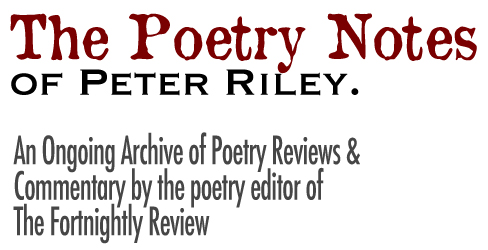Peter Riley: ‘Those of us constantly torn between “conventional” and “experimental” new poetry could note that there are other ways, such as a constant manipulation of the poetic image in the iambic theatre, to achieve the full-force rhythmic recognition of the ending.’
-
Two Cautionary Tales
Simon CollingsTwo Eclogues
John WikinsonThe Anamnesiologist
James PeakeThree Prose Poems
Mélisande FitzsimonsFive Sonnets in Honour of Sir Walter Raleigh
Richard BerengartenLast Poems
Béatrice Douvre, trans. by John Taylor -
Endangered Antiquarian
Will StoneRed
Daniel CoyleThe Indian Jungle by Sudhir Kakar
A review by Anthony HowellImaginator
Alan WallWhat Is Poetry?
Peter RobinsonTragedy: The Modern Heist
Alan WallA Celebration of the Life and Music of John White
Anthony Howell Departments
-
Contact the Editors here.
-
Audio archive: Two poems, with an audio track, from Heart Monologues by Jasmina Bolfek-Radovani | Daragh Breen’s Aural Triptych | Hayden Carruth reads Contra Mortem and Journey to a Known Place | Anthony Howell reads three new poems | James Laughlin reads Easter in Pittsburgh and five more | Peter Robinson reads Manifestos for a lost cause, Dreamt Affections, Blind Summits and Oblique Lights

Previous Serials
2011: Golden-beak in eight parts. By George Basset (H. R. Haxton).
2012: The Invention of the Modern World in 18 parts. By Alan Macfarlane.
2013: Helen in three long parts. By Oswald Valentine Sickert.
2016: The Survival Manual by Alan Macfarlane. In eight parts.
2018: After the Snowbird, Comes the Whale, by Tom Lowenstein.

LONDON
Readings in The Room: 33 Holcombe Road, Tottenham Hale, London N17 9AS – £5 entry plus donation for refreshments. All enquiries: 0208 801 8577
Poetry London: Current listings here.
Shearsman readings: 7:30pm at Swedenborg Hall, 20/21 Bloomsbury Way, London WC1. Further details here.NEW YORK
10 reliable poetry venues in NYC.
· The funeral of Isaac Albéniz
· Coleridge, poetry and the ‘rage for disorder’
· Otto Rank
· Patrons and toadying · Rejection before slips
· Cut with a dull blade
· Into the woods, everybody.
· Thought Leaders and Ted Talks
· How Mary Oliver ‘found love in a breathing machine.’
AND read here:
· James Thomson [B.V.]
A dilemma for educators:
Philosophy and the public impact.
.
Michelene Wandor on Derek Walcott and the T.S. Eliot Prize.
.Nick Lowe: the true-blue Basher shows up for a friend.
Anthony Howell: The new libertine in exile.
Kate Hoyland: Inventing Asia, with Joseph Conrad and a Bible for tourists.
Who is Bruce Springsteen? by Peter Knobler.
Martin Sorrell on John Ashbery’s illumination of Arthur Rimbaud.
The beauty of Quantitative Easing.




















Peter Riley’s summer poetry 2020.
Peter Riley: ‘They differ greatly from each other, but if my intention has succeeded, they all allow the possibility of what Blake would have called “multiple vision”, however casually or marginally.’